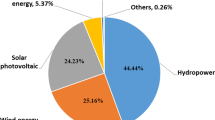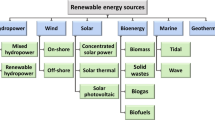Abstract
Emergy provides a general accounting mechanism that allows us to view the economy and the environment on the same income statement and balance sheet. This allows an auditor to verify the economic picture by checking it against a more complete representation of the flows and storages of real wealth as measured by emergy. In this study, we constructed emergy accounts for the state of West Virginia in 1997. The income statement showed annual production, consumption, and flows of emergy and dollars into and out of the state. The balance sheet evaluated the storage of emergy in some of the state's assets. Emergy indices were used to answer questions posed by managers and gain insight into the state's economic and environmental strengths and weaknesses. West Virginia has great wealth in nonrenewable resources (9E14 sej m−2 or 17 times the U.S. average). The investment ratio of emergy purchased outside to indigenous renewable and nonrenewable emergy was 2.2:1, which indicates a high potential for future development. However, the environmental loading ratio (14:1) was already 1.5 times higher than that found at an average location in the U.S. Twice as much emergy was exported as received and standard of living indicators showed that people have largely failed to benefit from their state's wealth. We propose that, just as in business, where decisions made using financial accounts ensure solvency; decisions governing the environment should be made based on an emergy accounting of activities, assets, and liabilities for the combined system of humanity and nature.
Similar content being viewed by others
References
Brown, M.T. and Ulgiati, S.: 2001, 'Emergy Measures of Carrying Capacity to Evaluate Economic Investments', Popul. Environ. 22, 471-501.
Campbell, D.E.: 1998, 'Emergy analysis of human carrying capacity and regional sustainability: An example using the State of Maine', Environ. Monit. Assess. 51, 531-569.
Campbell D.E.: 2000, 'A revised solar transformity for tidal energy received by the earth and dissipated globally: Implications for Emergy Analysis', in M.T. Brown (ed.), Emergy Synthesis, Proceedings of the First Biennial Emergy Analysis Research Conference, The Center for Environmental Policy, Department of Environmental Engineering Sciences, Gainesville, FL, USA, pp. 255-263.
Campbell, D.E.: 2001,'Proposal for including what is valuable to ecosystems in environmental assessments', Environ. Sci. Technol. 35, 2867-2873.
Campbell, D.E., Brandt-Williams, S.L. and Meisch, M.E.A.: (in review), Environmental Accounting Using Emergy: Evaluation of the State of West Virginia, U.S. Environmental Protection Agency, Office of Research and Development, Narragansett, RI, USA, p. 121.
CVI: 2002, Mid-Atlantic Highlands Action Plan, Transforming the Legacy, Canaan Valley Institute, Thomas, WV, USA, p. 56.
Clarkson, R.B.: 1964, Tumult on the Mountains: Lumbering in West Virginia-1770-1920 McLain Printing Company, Parsons, WV, USA, p. 410.
Lotka, A.J.: 1922, 'Contribution on the Energetics of Evolution', Proc. Natl. Acad. Sci. 8, 147-151.
Martinez-Alier, J.: 1987, Ecological Economics, Basil Blackwell, New York, NY, USA, p. 286.
Odum, H.T., Odum, E.C. and Blissett, M.: 1987, 'The Texas System, Emergy Analysis and Public Policy', A Special Project Report, L.B. Johnson School of Public Affairs, University of Texas at Austin, Office of Natural Resources, Texas Department of Agriculture, Austin, TX, USA, p. 92.
Odum, H.T.: 1988, 'Self-organization, transformity, and information', Science. 242, 1132-1139.
Odum, H.T.: 1994, Ecological and General Systems, University Press of Colorado, Niwot, CO, USA, p. 644. (reprint of Systems Ecology, John Wiley, 1983)
Odum, H.T.: 1996, Environmental Accounting, Emergy and Environmental Decision Making, John Wiley, New York, NY, USA, p. 370.
Odum, H.T., Odum, E.C.: 2001, A Prosperous Way Down, University Press of Colorado, Boulder, CO, USA, p. 326.
Rice, O.K.: 1993, West Virginia: A History, University Press, of Kentucky, Lexington, KY, USA.
Tilley, D.R.: 1999, 'Emergy Basis of Forest Systems', Ph.D. Dissertation, University of Florida, Gainesville, FL, USA, p. 296.
Rights and permissions
About this article
Cite this article
Campbell, D., Meisch, M., Demoss, T. et al. Keeping the Books for Environmental Systems: An Emergy Analysis of West Virginia. Environ Monit Assess 94, 217–230 (2004). https://doi.org/10.1023/B:EMAS.0000016890.70068.f7
Issue Date:
DOI: https://doi.org/10.1023/B:EMAS.0000016890.70068.f7




